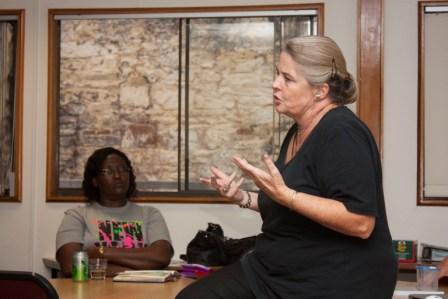
Debating the interface between community engagement and research at Rhodes University and the role of higher education institutions in this regard, Professor Caroline Palmer, Director of the Unilever Centre for Environmental Water Quality at the Rhodes Institute for Water Research called for Rhodes to become a hallmark institution for this type of research.
Speaking at an event organised to mark Community Engagement week at Rhodes, Prof Palmer advocated an integrated, sustained and committed approach to merging community engagement and research at Rhodes.
She challenged the audience with a series of questions pertaining to researchers conducting community engagement through working in communities.
“Rhodes advocates a pyramid of community engagement but what does it mean for research to be the front face of community engagement? Could we be the first university that embeds those facets into the sphere and become a hallmark university for this kind of research?
“I want there to be an energy at Rhodes that says we’re interested in making this our approach going forward,” she said while sharing her experience of working closely with the Sundays River municipality and surrounding community in various water research projects.
Prof Palmer said that through her research she was challenged to consider her role as a researcher and the potential for creating community engaged research.
Professor Rob O’Donoghue of the Environmental Learning and Research Centre (ELRC) presented “A brief review of environmental education as community engaged research” in which he provided an overview of the discipline of environmental education and its shifts towards incorporating a more community engagement oriented approach.
Describing the area of community engaged research as a vague field, Prof O’Donoghue said this type of approach requires extensive institutional support.
“We think we’re doing community engaged research but we don’t realise that we don’t have a handle on it,” he said, adding that researchers should challenge themselves with pertinent questions which many practitioners take for granted.
Mr Nelson Odume shared his experiences of conducting community engaged research in the Swartkops River catchment as part of his PhD studies on water quality management in the area.
Reflecting on the success of his engagement with local community, Mr Odume said, “We did not go to the municipality saying we know what you’re doing wrong. We are creating a space for learning. We need to engage with stakeholders to solve the problem.
“We were able to break through after building trust and this took eight months. The community began to see us as equal partners and had a sense of ownership in the research.”
By Sarah-Jane Bradfield
PicturebyEttione Ferreira
